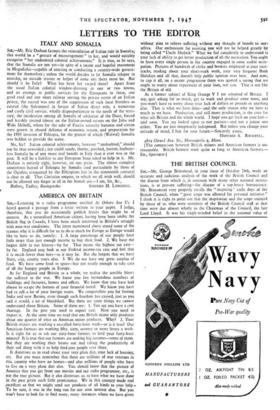AMERICA ON BRITAIN
Sm,—Listening to a radio programme entitled As Others See Us I heard quoted a passage from a letter written to your paper. I judge, therefore, that you do occasionally publish letters that might be of interest. As a naturalised American citizen, having been born under the British flag in Canada, I have been much interested in Britain's struggle with cost-war conditions. The letter mentioned above stated some of the reasons why it is difficult for us to do as much for Europe as Europe would like -to have us do, namely: 1. A large percentage of our people have little more than just enough income to buy their food. 2. We have the largest debt in our history—by far That means the highest tax rate— by far. England may look at our Federal income-tax rate and feel that it is much lower than hers—as it may be. But she forgets that we have State, city, county taxes also. 3. We do not have any great surplus of food. We have some food to spare—but not nearly enough to take care of all the hungry people in Europe.
As for England and Britain as a whole, we realise the terrible blows she suffered in the war. We know you lost tremendous numbers of buildings and factories, homes and offices. We know that you have had almost to scrape the bottom of your financial barrel. We know you have had to sell a lot of your foreign assets. We congratulate you for freeing India and now Burma, even though such freedom has caused, just as you said it would, a lot of bloodshed. But there are some things we cannot understand about Britain. Some of these are: 1. You say you have a coal shortage. In the past you used to export coal. Now you need to import it. At the same time we read that one British miner only produces about one quarter of what an Amercan miner produces. Why? 2. Your British miners are working a so-called forty-hour week—or is it less? Our American farmers are working fifty, sixty, seventy or more hours a week. Is it right for us to ask our sixty-hour farmers to feed your forty-hour miners? It is true that our farmers are making big incomes—some of them. But they are working their hearts out and taking the productivity of their soil along with it to help feed.you people over there.
It distresses us to read about your very plain diet, your lack of housing, etc. But you must remember that there are millions of war veterans in this country who have no homes—and also millions of people who have to live on a very plain diet also. You should know that the picture of America that you get from our movies and our radio programme, etc., is not the true picture. But it also distresses us to have what we have done in the past given such little prominence. We in this country made real „sacrifices so that we might send our products of all kinds to your help.. To be sure, it was in the long run for our own interest also. But you won't have to look far to find many, many instances where we have given without stint to relieve suffering without any thought of benefit to our- selves. Our enthusiasm for assisting you will not be helped greatly by being called "Uncle Shylock." What we fail completely to understand is your lack of ability to get better production of all the necessities. You ought to have every single person in the country engaged in some useful occu- pation. Pictures of hundreds of clerks and bookies employed at your race- tracks, reading about your short-work week, your very frequent Bank Holidays and all that, doesn't help public opinion over here. And now, to cap it all, on a recent programme there was quoted a saying that we ought to worry about repayment of your loan, not you. That is not like the Britain of old.
As a former subject of King George V I am ashamed of Britain. I say, quit asking for so much, get to work and produce some more, and you won't have to worry about your lack of dollars or pounds or anything else. That is what we have done—and the only reason why we have as much as we have. Production, and still more production, is the cure for what ails Britain and the whole world. I hope you get back on your feet— and soon. You are looked upon as our partner—and not a junior one either. You are just temporarily indisposed. But unless you change your attitude of mind, I fear for your future.—Sincerely yours, [The comparison between British miners and American farmers is un- reasonable. British fanners work quite as long as American farmers.— ED., Spectator.]


































 Previous page
Previous page